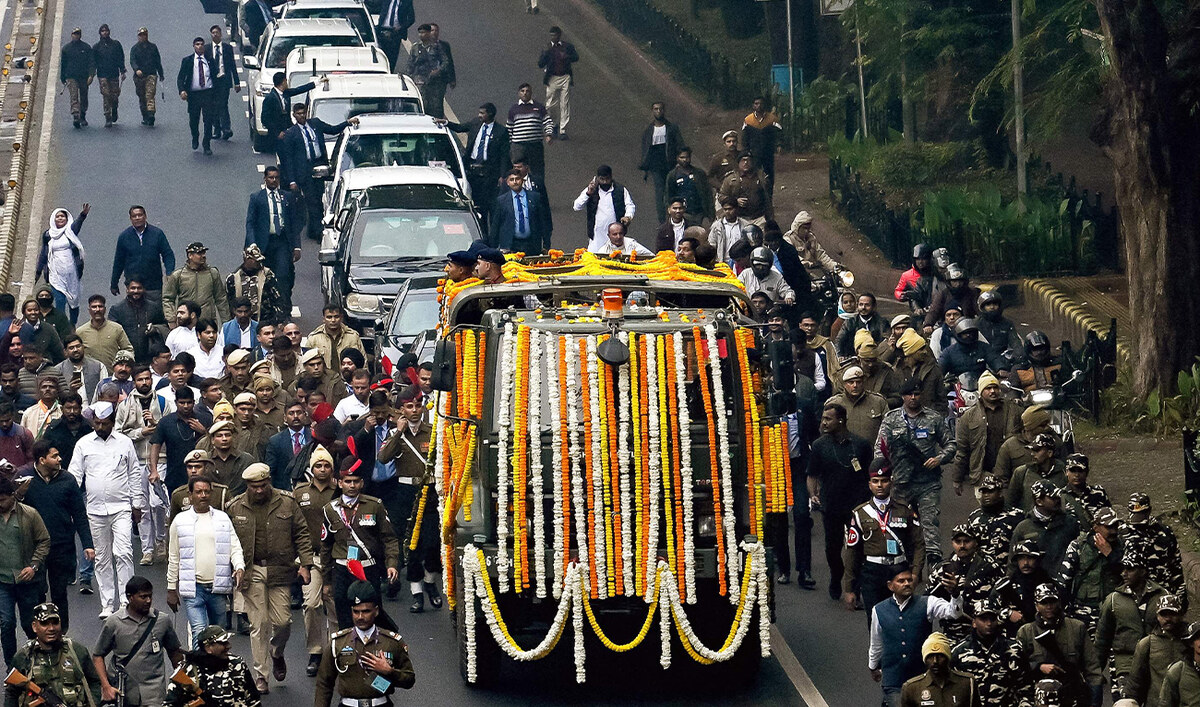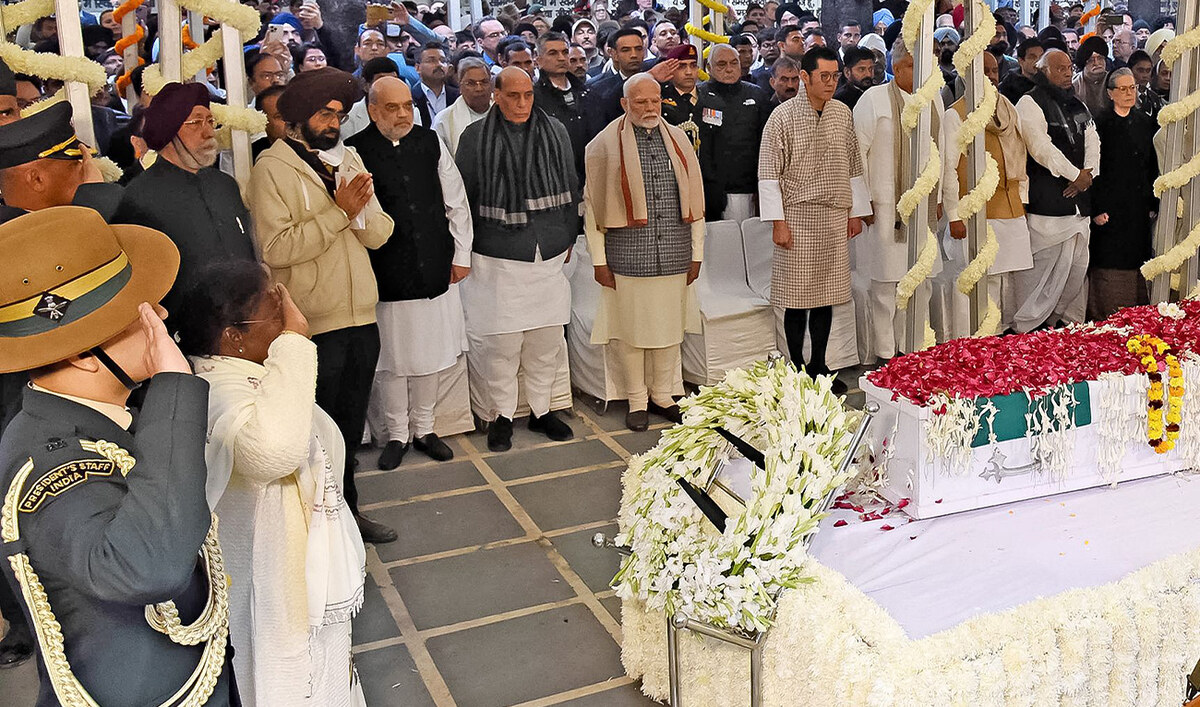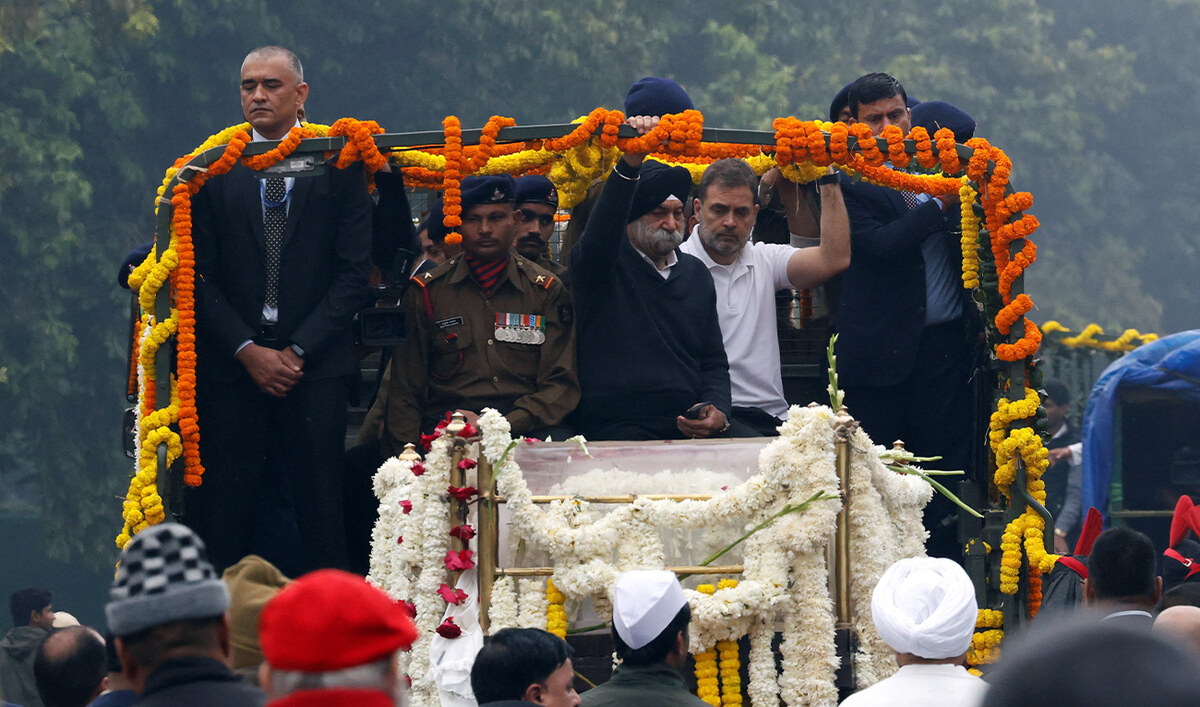KABUL: Only five hospitals in Afghanistan still offer COVID-19 treatment, with 33 others having been forced to close in recent months for lack of doctors, medicines and even heat. This comes as the economically devastated nation is hit by a steep rise in the number of reported coronavirus cases.
At Kabul’s only COVID-19 treatment hospital, staff can only heat the building at night because of lack of fuel, even as winter temperatures drop below freezing during the day. Patients are bundled under heavy blankets. Its director, Dr. Mohammed Gul Liwal, said they need everything from oxygen to medicine supplies.
The facility, called the Afghan Japan Communicable Disease Hospital, has 100 beds. The COVID-19 ward is almost always full as the virus rages. Before late January, the hospital was getting one or two new coronavirus patients a day. In the past two weeks, 10 to 12 new patients have been admitted daily, Liwal said.
“The situation is worsening day by day,” said Liwal, speaking inside a chilly conference room. Since the Taliban takeover almost six months ago, hospital employees have received only one month’s salary, in December.
Afghanistan’s health care system, which survived for nearly two decades almost entirely on international donor funding, has been devastated since the Taliban returned to power in August following the chaotic end to the 20-year US-led intervention. Afghanistan’s economy crashed after nearly $10 billion in assets abroad were frozen and financial aid to the government was largely halted.
The health system collapse has only worsened the humanitarian crisis in the country. Roughly 90 percent of the population has fallen below the poverty level, and with families barely able to afford food, at least a million children are threatened with starvation.
The omicron variant is hitting Afghanistan hard, Liwal said, but he admits it is just a guess because the country is still waiting for kits that test specifically for the variant. They were supposed to arrive before the end of last month, said Public Health Ministry spokesman Dr. Javid Hazhir. ‘ The World Health Organization now says Afghanistan will get the kits by the end of February.
The organization says that between Jan. 30 and Feb. 5, public laboratories in Afghanistan tested 8,496 samples, of which nearly half, were positive for COVID-19. Those numbers translate into a 47. 4 percent positivity rate, the world health body said.
As of Tuesday, the WHO recorded 7,442 deaths and close to 167,000 infections since the start of the pandemic almost two years ago. In the absence of large-scale testing, these relatively low figures are believed to be a result of extreme under-reporting.
Meanwhile, the new Taliban administration says it is trying to push vaccines on a skeptical population that often sees them as dangerous.
With 3.2 million vaccine doses in stock, Hazhir said the administration has launched a campaign through mosques, clerics and mobile vaccine clinics to get more people vaccinated. Currently barely 27 percent of Afghanistan’s 38 million people have been vaccinated, most with the single-dose Johnson and Johnson vaccine.
Getting Afghans to follow even a minimum of safety protocols, like mask wearing and social distancing, has been near impossible, Liwal said. For many struggling to feed their families, COVID-19 ranks low on their list of fears, he said. The Public Health Ministry has run awareness campaigns about the value of masks and social distancing, but most people aren’t listening.
Even in the Afghan Japan hospital, where signs warn people that mask wearing is mandatory, most people in the dimly lit halls were without masks. In the intensive care unit, where half of the 10 patients in the ward were on ventilators, doctors and attendants wore only surgical masks and gowns for protection as they moved from bed to bed.
The head of the unit, Dr. Naeemullah, said he needs more ventilators and, even more urgently, he needs doctors trained on using ventilators. He is overstretched and rarely paid, but feels duty-bound to serve his patients. Liwal said several doctors have left Afghanistan.
Most of the hospital’s 200 employees come to work regularly despite months without pay.
In December, a US-based charity affiliated with Johns Hopkins University provided two months funding, which gave the hospital staff their December salary and a promise of another paycheck in January. The public health ministry is now in negotiations with the WHO to take over the cost of running the hospital through June, said Liwal.
Liwal said other Kabul hospitals used to be able to take some patients, but now no longer have the resources. With a lack of funds and staff leaving, 33 facilities offering COVID-19 treatment nationwide have shut down, he said.
The Afghan Japan hospital’s only microbiologist, Dr. Faridullah Qazizada, earned less than $1,000 a month before the Taliban took power. He has received only one month’s salary since August, he said. He says his equipment and facilities are barely adequate.
“The whole health system has been destroyed,” he said.
New COVID-19 wave batters Afghanistan’s crumbling health care
https://arab.news/9439b
New COVID-19 wave batters Afghanistan’s crumbling health care

- The COVID-19 ward is almost always full as the virus rages
- Most of the hospital’s 200 employees come to work regularly despite months without pay
Several airlines cancel flights to Russia after Azerbaijan Airlines crash

- Turkmenistan Airlines was the latest airline to announce cancelations Saturday
- Kazakhstan’s Qazaq Air has suspended its flights to Yekaterinburg until the end of January
Moscow has declined to comment on reports the plane could have been accidentally shot down by its air defense.
Russia has said that Grozny, the Chechen capital where the plane was meant to land, was being attacked by Ukrainian drones that day.
It crashed near the Kazakh city of Aktau Wednesday, killing 38 of the 67 people on board.
Turkmenistan Airlines — the national carrier of the reclusive Central Asian state — was the latest airline to announce cancelations Saturday.
It said that “regular flights between Ashgabat-Moscow-Ashgabat were canceled from 30/12/2024 to 31/01/2025,” without giving an explanation.
The decision came after UAE airline flydubai suspended flights between Dubai and the southern Russian cities of Mineralnye Vody and Sochi that were scheduled between December 27 and January 3.
Kazakhstan’s Qazaq Air has suspended its flights to Russia’s Urals city of Yekaterinburg until the end of January.
Earlier this week, Israeli airline El Al said it was suspending its flights to Moscow for a week.
The Azerbaijan Airlines Embraer 190 crashed near the western Kazakh city of Aktau, on the shores of the Caspian Sea.
It was carrying out a flight between Azerbaijan’s capital Baku and the city of Grozny in Russia.
For several days, some Western experts have been pointing to a crash caused by a Russian anti-aircraft missile.
Citing preliminary results of an investigation, Azerbaijan’s transport minister said Friday that the crash suffered physical “external interference.”
Statements from Azerbaijan citing the investigation into the incident suggest Baku believes the plane was hit mid-air.
On Friday, White House spokesman John Kirby said Washington has “indications” Russia may have been responsible, without giving details.
Cyber attack on Italy's Foreign Ministry, airports claimed by pro-Russian hacker group

- The pro-Russian hacker group Noname057(16) claimed the cyberattack on Telegram
MILAN: Hackers targeted around ten official websites in Italy on Saturday, including the websites of the Foreign Ministry and Milan’s two airports, putting them out of action temporarily, the country’s cybersecurity agency said.
The pro-Russian hacker group Noname057(16) claimed the cyberattack on Telegram, saying Italy’s “Russophobes get a well deserved cyber response.”
A spokesperson for Italy’s cybersecurity agency said it was plausible that the so-called “Distributed Denial of Service” (DDoS) attack could be linked to the pro-Russian group.
In such attacks, hackers attempt to flood a network with unusually high volumes of data traffic in order to paralyze it.
The spokesperson said the agency provided quick assistance to the institutions and firms targeted and that the attack’s impact was “mitigated” in less than two hours.
The cyberattack has not caused any disruptions to flights at Milan’s Linate and Malpensa airports, a spokesperson for SEA, the company which manages them, said.
While the websites were inaccessible, the airports’ mobile apps continued to function, the SEA spokesperson added.
Finland moves tanker suspected of undersea cable damage closer to port

- BBaltic Sea nations have been on high alert after a string of outages of power cables, telecom links and gas pipelines since Russia invaded Ukraine in 2022
OSLO: Finnish authorities said on Saturday they are moving an impounded tanker closer to port after boarding the vessel carrying Russian oil earlier this week on suspicion it had damaged an undersea power line and four telecoms cables.
Baltic Sea nations have been on high alert after a string of outages of power cables, telecom links and gas pipelines since Russia invaded Ukraine in 2022, and NATO said on Friday it would boost its presence in the region.
The Cook Islands-registered ship, named by authorities as the Eagle S, was boarded on Thursday by a Finnish coast guard crew that took command and sailed the vessel to Finnish waters, a coast guard official said.
Finnish police believe the Eagle S may have caused the damage to undersea cables the previous day by dragging its anchor along the seabed.
“The police begin an operation to transfer the Eagle S tanker from the Gulf of Finland to Svartbeck, an inner anchorage near the port of Kilpilahti,” the Helsinki police department said in a statement on Saturday.
This would be a better place to carry out investigations, it added.
Finland’s customs service believes the ship is part of a “shadow fleet” of aging tankers being used to evade sanctions on the sale of Russian oil.
The Kremlin said on Friday Finland’s seizure of the ship was of little concern to it. In the past, Russia has denied involvement in any of the Baltic infrastructure incidents.
France asks Indonesia to transfer national on death row

- Indonesia has in recent weeks released half a dozen high-profile detainees
- French diplomats have acknowledged that talks were underway for the transfer of Serge Atlaoui
JAKARTA: France has sent Indonesia an official request for the transfer of a French death row inmate who has spent nearly 20 years in prison, an Indonesian minister said on Saturday.
Indonesia has in recent weeks released half a dozen high-profile detainees, including a Filipino mum on death row and the last five members of the so-called “Bali Nine” drug ring.
French diplomats have acknowledged that talks were underway for the transfer of Serge Atlaoui, a 61-year-old Frenchman arrested in 2005 at a drugs factory outside the capital Jakarta.
The Indonesian government has now confirmed it received the official transfer request, which will be discussed in early January.
“We have received a formal letter requesting the transfer of Serge Atlaoui,” senior law and human rights minister Yusril Ihza Mahendra said.
The French embassy in Jakarta declined AFP’s request for comment.
Father-of-four Atlaoui has maintained his innocence, claiming that he was installing machinery in what he thought was an acrylics plant.
He was initially sentenced to life in prison, but the Supreme Court in 2007 increased the sentence to death on appeal.
Atlaoui was held on the island of Nusakambangan in Central Java, known as Indonesia’s “Alcatraz,” following the death sentence, but he was transferred to the city of Tangerang, west of Jakarta, in 2015 ahead of his appeal.
That year, he was due to be executed alongside eight other drug offenders but won a temporary reprieve after Paris stepped up pressure, with Indonesian authorities agreeing to let an outstanding appeal run its course.
In the appeal, Atlaoui’s lawyers argued that then-president Joko Widodo did not properly consider his case as he rejected Atlaoui’s plea for clemency — typically a death row convict’s last chance to avoid the firing squad.
The court, however, upheld its previous decision that it did not have the jurisdiction to hear a challenge over the clemency plea.
Atlaoui’s lawyer, Richard Sedillot, said last month that there was still “considerable hope” for a transfer.
Together Against the Death Penalty (ECPM) said the official request is the “penultimate step in a long fight” for those at the Paris-based organization who have campaigned for years to prevent Atlaoui’s execution.
“We are now waiting for this transfer to become a reality,” ECPM director Raphael Chenuil-Hazan said.
Earlier this month, Filipino inmate Mary Jane Veloso tearfully reunited with her family after nearly 15 years on Indonesia’s death row. She was transferred to a women’s prison in Manila where she awaits a hoped-for pardon for her drugs conviction.
Indonesia has some of the world’s toughest drug laws and has executed foreigners in the past.
At least 530 people were on death row in the Southeast Asian nation, mostly for drug-related crimes, according to data from rights group KontraS, citing official figures.
According to Indonesia’s Immigration and Corrections Ministry, more than 90 foreigners were on death row, all on drug charges, as of early November.
Despite ongoing negotiations for prisoner transfers, the Indonesian government recently signaled that it would resume executions — on hiatus since 2016 — of drug convicts on death row.
India’s former PM Manmohan Singh cremated with state honors

- Singh’s body, draped in Indian flag, was carried through the capital on a flower-decked carriage pulled by a ceremonial army truck
- Modi, who called Singh one of the nation’s ‘most distinguished leaders,’ attended the funeral, along with President Droupadi Murmu
NEW DELHI: The body of Manmohan Singh, the former Indian prime minister whose death has spark outpourings of grief at home and accolades from abroad, was cremated on Sunday on the banks of the Yamuna River in New Delhi with full state honors.
The funeral was conducted in the Sikh tradition as priests chanted hymns, after Singh’s body, draped in the Indian flag, was carried through the capital on a flower-decked carriage pulled by a ceremonial army truck.

The flag was removed and the body covered with a saffron cloth before it was placed on the pyre.
Since Singh died on Thursday at 92, many have taken up his comment near the end of his 10-year rule that “history will be kinder to me than the contemporary media.”
He was referring to a perception of weak leadership as he headed a coalition government facing numerous charges of corruption, which was thrown out of office in the 2014 election won by his successor Narendra Modi.
Modi, who called Singh one of the nation’s “most distinguished leaders” after his death, attended the funeral, along with President Droupadi Murmu and representatives of various countries. Modi’s government has decided to allocate land for Singh’s memorial.

Singh, considered the architect of India’s economic liberalization, had criticized Modi’s economic policies such as demonetization and introducing a goods and services tax.
Singh is survived by his wife and three daughters.

Congress Leader Rahul Gandhi accompanied Singh’s family on the truck to the Nigambodh Ghat cremation site after the procession from party headquarters in New Delhi, where people joined Congress party leaders and members to pay their last respects.
The leaders of the US, Canada, France, Sri Lanka, China and Pakistan were among those expressing grief at Singh’s death and highlighting his international contributions.


















